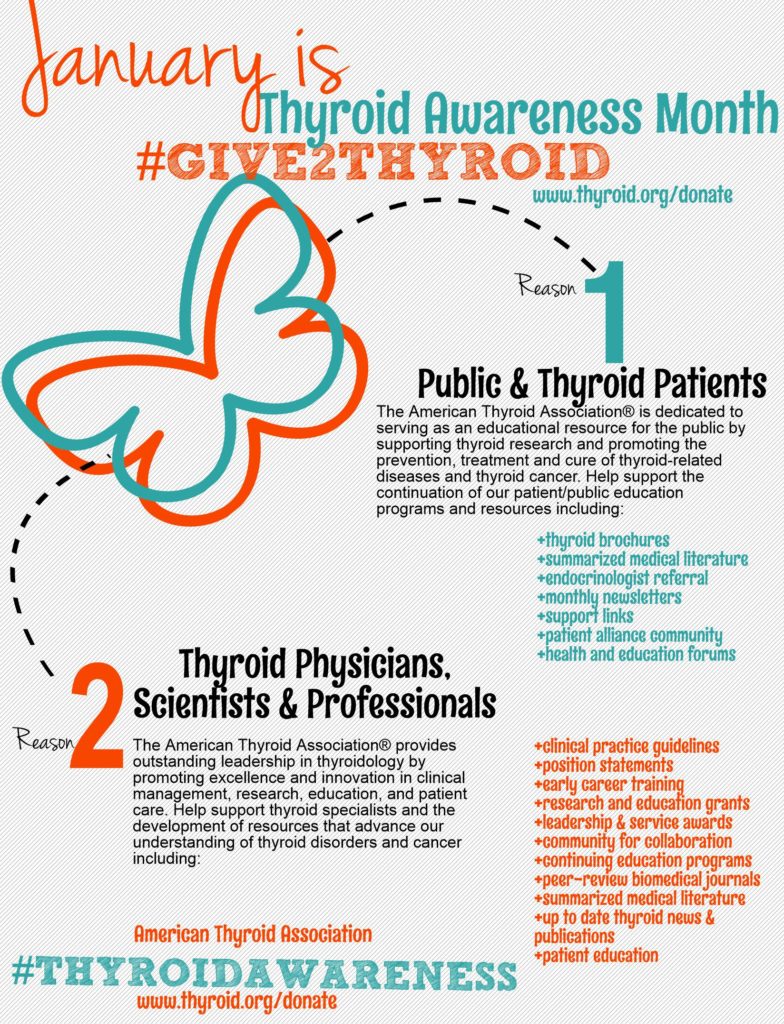January: the beginning of a new year, the month everyone decides to go back to the gym or get in shape, the month for changes or new beginnings.
January is also Thyroid Awareness Month.
The thyroid gland is located at the base of your neck in front of your trachea (or windpipe). The thyroid gland makes, stores, and releases two hormones that control your metabolism, which is the rate at which every part of your body works. When your thyroid gland is working the way it should, your metabolism stays at a steady pace—not too fast or not too slow. The thyroid gland is controlled by the pituitary gland (a gland in your brain). The pituitary gland makes thyroid-stimulating hormone (TSH). TSH tells the thyroid gland to make more hormone if needed.
Thyroid disease is diagnosed by your symptoms, an exam, and blood tests. Problems with your thyroid gland may be determined to be hypothyroidism or hyperthyroidism. Hypothyroidism occurs when the thyroid gland does not make enough of the thyroid hormones to maintain your normal body metabolism. In most cases, hypothyroidism is treated with medication that contains thyroid hormone. The dosage of the medication is increased slowly until a normal level of thyroid hormone has been reached in the blood. Common symptoms of hypothyroidism include the following:
- Fatigue or weakness
- Weight gain
- Decreased appetite
- Change in menstrual periods
- Loss of sex drive
- Feeling cold when others do not
- Constipation
- Muscle aches
- Puffiness around the eyes
- Brittle nails
- Hair loss
Hyperthyroidism results when the thyroid gland makes too much thyroid hormone. This causes your metabolism to speed up. The most common cause of hyperthyroidism is a disorder known as Graves disease. It most often affects women between the ages of 20 years and 40 years. Anti-thyroid medication can be used to reduce the amount of thyroid hormone your body is making. Medications known as beta-blockers control rapid heart beat. If these medications do not help, your health care provider may suggest other treatments. Common symptoms of hyperthyroidism include the following:
- Fatigue
- Weight loss
- Nervousness
- Rapid heart beat
- Increased sweating
- Feeling hot when others do not
- Changes in menstrual periods
- More frequent bowel movements
- Tremors
Many medications used to treat thyroid disease in pregnancy are safe for your unborn child. However, your health care provider may monitor you closely while you are being treated. Radioactive iodine, which is sometimes used to treat hyperthyroidism, cannot be taken during pregnancy. It may injure the thyroid gland of the fetus and may cause the baby to have hypothyroidism.
Some women may not have thyroid problems during pregnancy, but develop problems after childbirth. This condition is called postpartum thyroiditis. It often is a short-term problem and hormone levels quickly return to normal.
Regular screenings for thyroid disease should be done every 5 years beginning at age 50 years. Women at risk may need to be screened earlier or more often. If you have any questions about your thyroid health, be sure to talk to your provider at The Woman’s Group.

